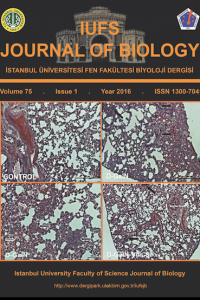Abstract
References
- Aebi H. (1984) Catalase in vitro. Methods in Enzymology, 105: 121-26.
- Arda-Pirincci P., Oztay F., Bayrak B.B., Yanardag R. and Bolkent S. (2012) Teduglutide, a glucagon-like peptide 2 analogue: a novel protective agent with anti-apoptotic and anti-oxidant properties in mice with lung injury. Peptides, 38(2):238-47.
- Beutler E. (1975) Glutathione in Red Cell Metabolism. A Manual of Biochemical Methods. 2nd Edition, Grune and Stratton, New York, USA.
- Bowler R.P., Velsor L.W., Duda B., Chan E.D., Abraham E., Ware L.B., Matthay M.A. and Day B.J. (2003) Pulmonary edema fluid antioxidants are depressed in acute lung injury. Critical Care Medicine, 31(9):2309-15.
Efficacy of antioxidant vitamins (vitamin C, vitamin E, beta-carotene) and selenium supplement on D-galactosamine-induced lung injury
Abstract
Effects of vitamin combination with selenium on acute lung injury in rats were examined in this study. Four experimental groups of rats were used as follows: group 1, animals administered intraperitoneally physiological saline solution; group 2, rats fed with vitamin C, vitamin E, beta-carotene and sodium selenate for three days; group 3, a single intraperitoneally injection of D-galactosamine (D-GaIN; 500 mg kg-1) into rats; group 4, animals fed with the antioxidant vitamin combination with selenium for three days, and administered D-GaIN. Lung tissues were examined using light microscope, and the following biochemical parameters were measured glutathione (GSH), lipid peroxidation (LPO) levels and tissue factor (TF), lactate dehydrogenase (LDH), catalase (CAT), superoxide dismutase (SOD), glutathione peroxidase (GPx), paraoxonase (PON), myeloperoxidase (MPO), xanthine oxidase (XO) and sodium potassium ATPase (Na+/K+-ATPase) activities in lung tissues. Extensive edema in peripheral areas, mononuclear cell infiltrations around venules and locally a honeycomb-like structure were observed in the lung of group 3 rats. GSH, GPx and PON activities were decreased, whereas LPO level, TF, LDH, CAT, SOD, MPO and XO activities were increased in rats treated with D-GalN. Administration of the antioxidant combination protected lung tissue against damage by enhancing biochemical chances and pulmonary edema in group 3 animals, while no significant effect on protection of pulmonary inflammation was observed. In conclusion, the antioxidant vitamin supplementation with selenium can be used in the prevention of acute lung injury.
Keywords
Antioxidant ascorbic acid β-carotene D-galactosamine selenium vitamin E lung injury oxidative stress
References
- Aebi H. (1984) Catalase in vitro. Methods in Enzymology, 105: 121-26.
- Arda-Pirincci P., Oztay F., Bayrak B.B., Yanardag R. and Bolkent S. (2012) Teduglutide, a glucagon-like peptide 2 analogue: a novel protective agent with anti-apoptotic and anti-oxidant properties in mice with lung injury. Peptides, 38(2):238-47.
- Beutler E. (1975) Glutathione in Red Cell Metabolism. A Manual of Biochemical Methods. 2nd Edition, Grune and Stratton, New York, USA.
- Bowler R.P., Velsor L.W., Duda B., Chan E.D., Abraham E., Ware L.B., Matthay M.A. and Day B.J. (2003) Pulmonary edema fluid antioxidants are depressed in acute lung injury. Critical Care Medicine, 31(9):2309-15.
Details
| Primary Language | English |
|---|---|
| Journal Section | Research Articles |
| Authors | |
| Publication Date | May 15, 2017 |
| Submission Date | May 16, 2017 |
| Published in Issue | Year 2016 Volume: 75 Issue: 1 |


